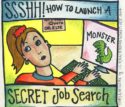Play the Smart Bullseye Game to land a job
It’s easy to get discouraged by the news media and blame the slow economic recovery for lack of interviews in your job search. Or blame your past employer for letting you go. Or Wall Street for your depleted savings. Or the guys on the other side of the aisle for every other problem in the world.
But no one ever wins by playing the Blame Game.
Instead, play the Smart Bullseye Game. The Smart Bullseye game, a job search strategy, is one in which you build yourself a Quiver, collect Arrows, acquire some Targets, take some practice shots, and start shooting.
First, playing the Smart Bullseye Game takes the pressure off the idea of finding a job, because, after all, you’re playing a game. The game inherently inspires an attitude of gratitude, and builds your confidence — both essential keys to success. That’s because you’re grateful for every chance to make a shot, because you know that each shot is practice, improving your skills. To win, you continually replace Arrows in your Quiver, and with each practice shot you get better and better, so your confidence grows naturally.
You start by building your own pieces.
Quiver: The first step is to build your Quiver (your job search objectives.) The best Quiver is the one that inspires enthusiasm and excitement. You build it by answering questions like these, on paper:
- Where do you want to be one year from now, and five years from now? What do you want to be doing with your time and talents?
- Besides the income security, what is it you enjoy doing most? What gives you joy? What activity makes time disappear and leaves you feeling uplifted?
- If you were to be diagnosed with a terminal illness and given one year to live and had all the money you and your family needed to live comfortably–what would you do this coming year? (Don’t feel stressed about this — remember, this is a game! Have fun!)
- Re-write these objectives in the present tense: “I enjoy ____ing every day.” Every morning and before bed, pull out these Exciting Objectives, re-read them, close your eyes, visualize yourself doing them, visualize all the sensory feelings and particularly, allow yourself to get excited about them. Journal a few words of gratitude for having these in your life. This emotional energy is like a magnet, and the more positive excitement you generate, for just a few minutes every day, the stronger the magnet. (This is also why you don’t want to play the Blame Game — it attracts the negative.)
Targets: Once you answer these questions and have your Quiver built with Exciting Objectives, you can begin to narrow the focus and develop Targets (job prospects.) Write down the industry(s), company(s), job(s), and location(s), that would be ideal for you, to fulfill the above goals. Now you’re starting to draw your Targets: an industry, a set of jobs. Narrow it further: start researching, looking for the specific companies that match your values, your desired job, your desired workplace. Put them in order of priority. These now become the rings on your Target; the most desired companies and jobs are in the center Bullseye. Next build your Arrrows.
Arrows: Here are some Arrows (resources, proper attitude, job search strategies):
- Knowledge from Research
Conduct research on companies you’re interested in, asking questions like: What is their mission? What problem is the company facing? What is the goal of the department my target job is in ? How can I help overcome the problem and achieve the goals? What’s their corporate culture like? Would I fit in there, be happy, in this culture? The more Knowledge from Research, the more Arrows. - Mirror Work
Take an honest look at your personal habits and skills and decide if anything needs changing, eliminating, updating, correcting. In your chosen target industry, what are the skills used by the topmost performers in that field? How do you rate on them? Are you in top condition? Is there a skill you need to practice, to hit your target? Do you need to take a class or workshop (something you can then put on your resume)? And what about Baggage or bad habits that are will weigh down your arrows, or keep you from hitting the bullseye? Here’s an excellent article by Lisa Rangel containing an exhaustive list of habits and practices that are detrimental to your job search strategy, from laziness to doing the same old thing and expecting different results. Are you doing any of these things that will prevent you from succeeding? Get rid of these from your Quiver! Look in the mirror and take inventory today. - Online Presence
How’s your LinkedIn profile? Did you know that the vast majority of companies now rely on LinkedIn to source and vet candidates? Is your profile written right, according to best practice standards? Have you Googled yourself? What comes up under your name? Is your digital footprint helping you, or hurting you? Get to work on building online Arrows. - Networking
 Believe it or not, it’s still a who-you-know world. Eighty percent of jobs are filled without ever being posted. You need to be out there, live and in person, spreading the word, asking others for leads, insights, connections — all connected to your Targets. Here’s a great article by Joshua Waldman that dissects a well-written email networking inquiry, from a job candidate, to a near stranger known to have some insights into a company the inquirer was interested in. It is a great example of both networking and research.The importance of the Arrows of Networking and Knowledge from Research cannot be overemphasized.
Believe it or not, it’s still a who-you-know world. Eighty percent of jobs are filled without ever being posted. You need to be out there, live and in person, spreading the word, asking others for leads, insights, connections — all connected to your Targets. Here’s a great article by Joshua Waldman that dissects a well-written email networking inquiry, from a job candidate, to a near stranger known to have some insights into a company the inquirer was interested in. It is a great example of both networking and research.The importance of the Arrows of Networking and Knowledge from Research cannot be overemphasized. - Key-Word-Rich Resume and Cover Letter
The Resume is the most obvious Arrow. But take note: Approximately 50% of applications are discarded after scanning by job applicant tracking software (ATS), simply because they lack key words from the job description. If you are not updating your resume with key words every time you send it out, your Arrow is failing to hit the target. Aiming for a target that 118 other people are aiming for, with a poorly written resume that lacks key words, is why people fail to get interviews. The days of having a stock, generic resume and cover letter are long gone.
- Practical Knowledge
Another obvious Arrow is Practical Knowledge about current best practices to get hired–what to do and what not to do–in writing a resume, a cover letter, interviewing, and managing your career. And being willing to either learn to do what it takes to be successful, or hire someone to do it for you. If you’re in the Milwaukee area, join our writer’s group called Write Stuff Now. Invest in yourself by coming to one of our ongoing Career Success workshops.
- Confidence in yourself grows when you invest in your career. Believe you can learn, believe in yourself and your ability to succeed. Stop playing the Blame Game. It’s no fun for anybody and diminishes your own power, by putting the power outside yourself. Play the Smart Bullseye Game to build confidence in and empower yourself.
 Equipping yourself with lots of good Arrows in your Quiver, eliminating Baggage, taking practice shots at your Targets, betters the odds you’ll hit the Bullseye. Start building your pieces today, and play the Smart Bullseye Game!
Equipping yourself with lots of good Arrows in your Quiver, eliminating Baggage, taking practice shots at your Targets, betters the odds you’ll hit the Bullseye. Start building your pieces today, and play the Smart Bullseye Game!











Recent Comments